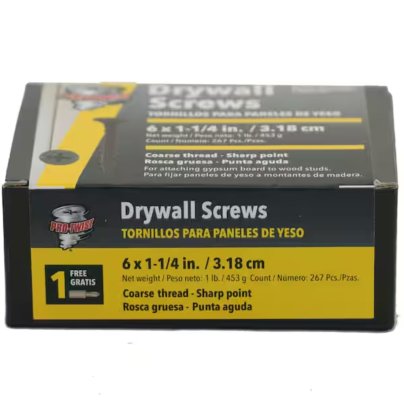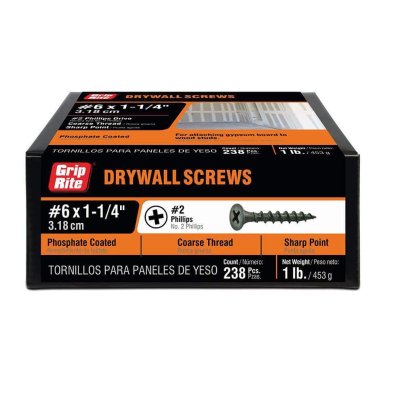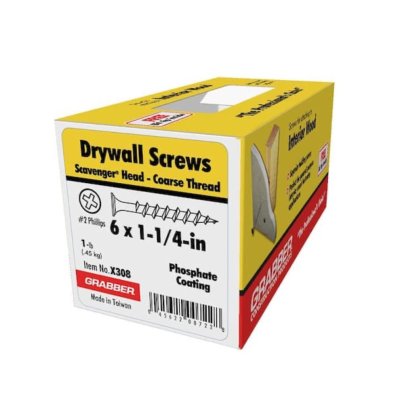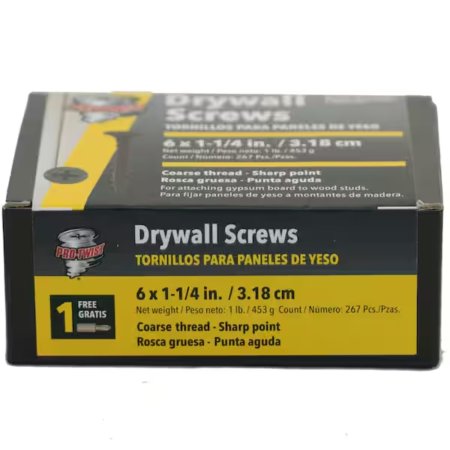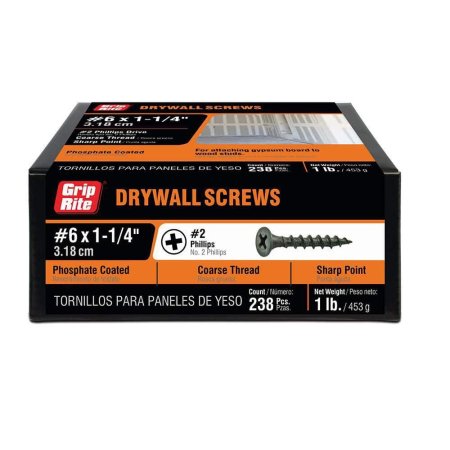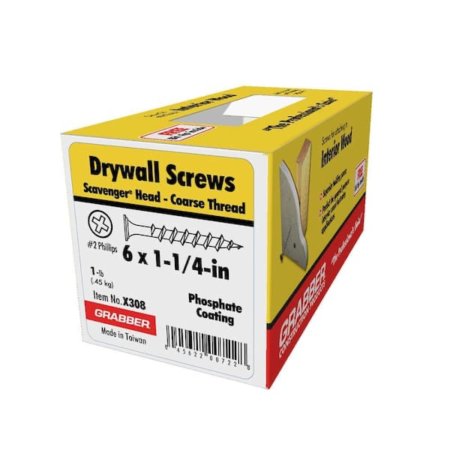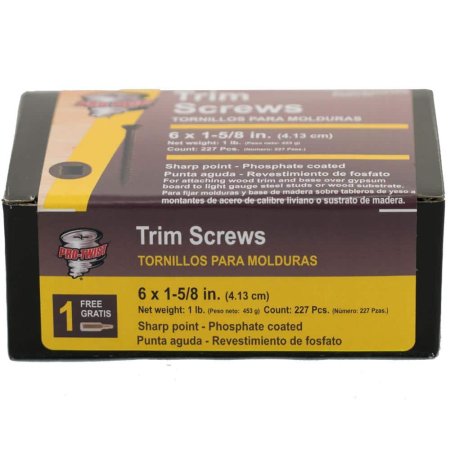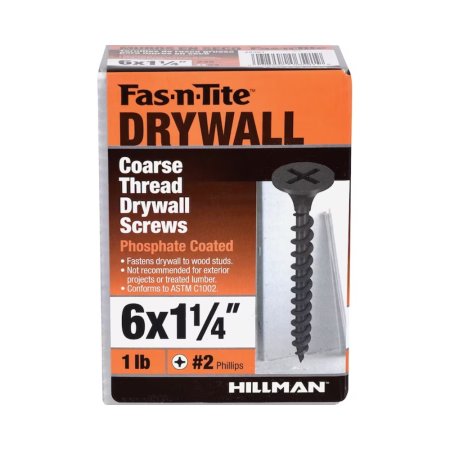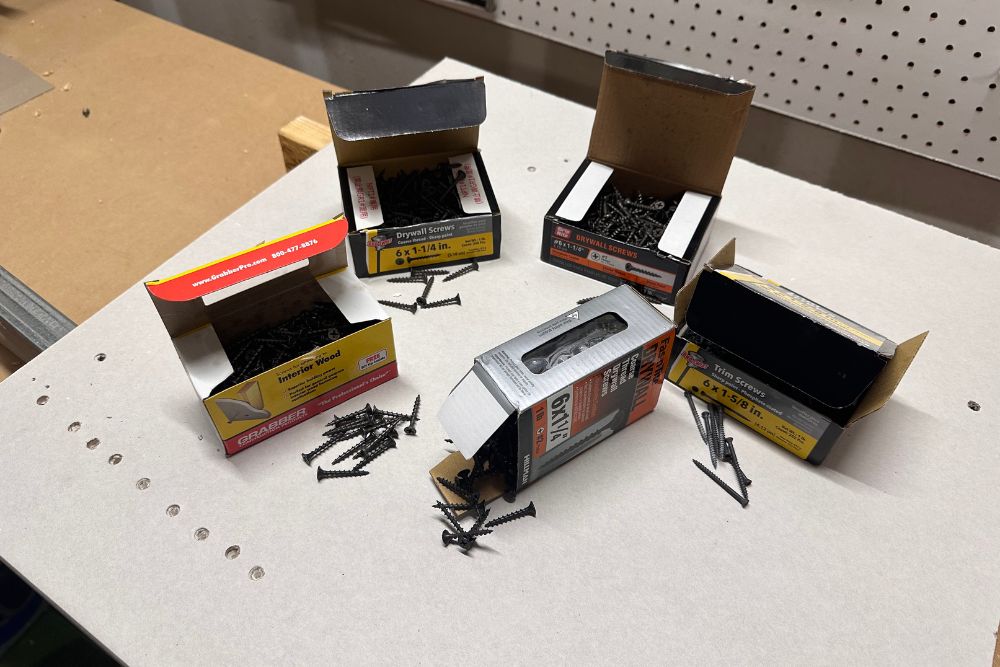
We may earn revenue from the products available on this page and participate in affiliate programs. Learn More ›
Whether you’re hanging drywall to finish a garage or a bonus room, you’ll need plenty of drywall screws to attach that Sheetrock to the wall studs. And while most drywall screws may look the same, they aren’t all created equal. Some have coarse threads designed to bite into wood framing, while others use self-drilling points and tight threading to bore into metal. There are also drywall screws specially designed for attaching trim over drywall. And while most drywall screws are made from the same material, they can vary in how easy they are to drive through drywall and into framing.
Having plenty of experience working with drywall in my own home, I’m familiar with the various brands and types of screws out there. I put six different products to the test to find out which ones are the best drywall screws.
- BEST OVERALL: Pro-Twist Phillips-Drive Coarse-Thread Drywall Screw
- BEST BANG FOR THE BUCK: Grip-Rite Phillips Coarse-Thread Drywall Screws
- BEST COARSE-THREADED: Grabber Phillips Bugle-Head Drywall Screws
- BEST FINE-THREADED: Everbilt Phillips Self-Drilling Drywall Screws
- BEST TRIM HEAD: Pro-Twist Phosphate-Coated Trim-Head Drywall Screw
- ALSO CONSIDER: Fas-n-Tite Coarse-Thread Drywall Screws
Before You Buy Drywall Screws
Drywall screws vary in length, gauge, and type to suit different projects. The thickness of the drywall and stud material will all determine what drywall screw you need for the job. You’ll also want to decide whether or not you’ll need additional hardware for the job, such as drywall anchors or one of the best concrete anchors, depending on the material you’re screwing into. We’ll go into all of these factors in the What to Consider section below.
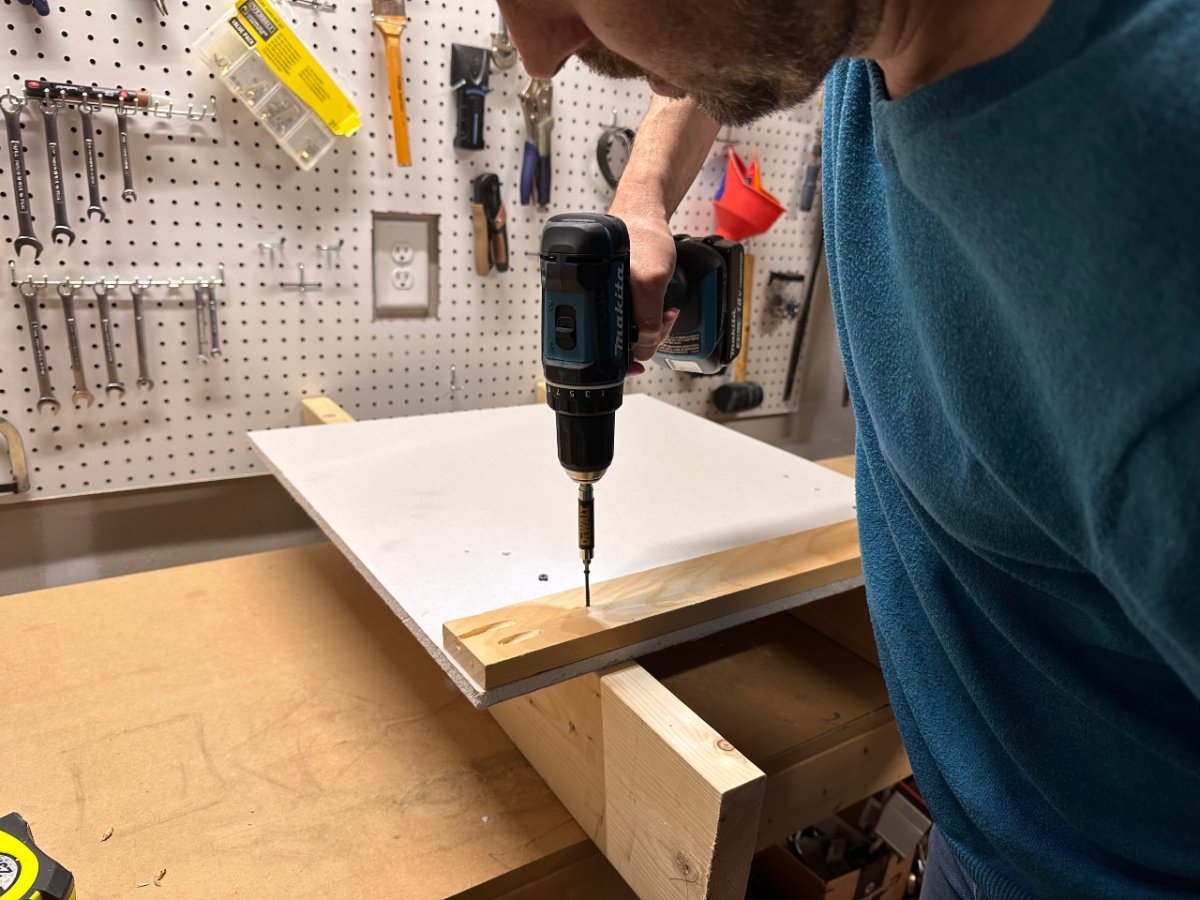
How We Tested the Best Drywall Screws
For the five coarse-threaded drywall screws on my list, I created a small sample of drywall with framing. I drove six of each type of screw into the framing using a cordless drill/driver, evaluating them for ease of installation, how cleanly they sunk into the drywall paper, and how tight a bond they created between the Sheetrock and stud. I repeated the same test with a self-drilling fine-threaded screw using a metal stud. Finally, I tested the trim screw on the list by attaching a piece of trim to my drywall framing sample. Along with performance, I also considered value based on their price.
Testing Stats
- Products tested: 6
- Hours spent testing: 3
- Tests performed: 2
- Average price: $9.55
Our Top Picks
The drywall screws below are the best options for hanging drywall. They include drywall screws for metal studs and several types for wood studs. There’s also one for attaching trim to drywall. All of the products below come in a variety of sizes to suit varying projects.
Best Overall
Pro-Twist Phillips-Drive Coarse-Thread Drywall Screw
Pros
- Sharp point seats easily into the first layer of drywall for easy starting
- Easy to control the depth, which helps to prevent over-sinking into drywall
- Bugle head is easy to mud and sand over
Cons
- Pricier than other phosphate-coated steel drywall screws
Product Specs
- Material: Phosphate-coated steel
- Sizes: 1¼, 1⅝, 2, 2½, 3 inches
- Thread: Coarse
Our Ratings: Ease of Installation 5/5; Strength 5/5; Value 4/5
Pro-Twist’s drywall screws check all the boxes for what you want in this kind of fastener. I loved how easy this drywall screw is to start. The sharp point seats nicely into the drywall paper layer and then drives in smoothly with a cordless screwdriver. I had great depth control with the Pro-Twist drywall screw. I didn’t run into problems with over-sinking as I did with other drywall screws. This gave me the confidence to go at a faster pace without having to worry about accidentally damaging drywall. Once installed, these screws create a nice tight bond between studs and Sheetrock.
As with most drywall screws, Pro-Twist screws have a flat bugle-style head. That, coupled with the ability to sink these screws to that just-right depth, made mudding and sanding over them an easy task. While they are pricier than other phosphate-coated drywall screws, their ease of use makes them worth the extra money.
Get the Pro-Twist Phillips-drive drywall screws at The Home Depot.
Best Bang For The Buck
Grip-Rite Phillips Coarse-Thread Drywall Screws
Pros
- More affordable than other brands of phosphate-coated steel drywall screw
- Go in more slowly, making it easier to control depth
- Bugle head makes mudding and sanding over them easy
Cons
- Shallow threads on the screw shaft give them less grab
Product Specs
- Material: Phosphate-coated steel
- Sizes: 1¼, 1⅝, 2, 2½, 3 inches
- Thread: Coarse
Our Ratings: Ease of Installation 4/5; Strength 4/5; Value 5/5
A pound of Grip-Rite screws costs a few dollars less than other brands, making them a great budget option, especially for bigger drywall hanging projects. And while the Grip-Rite screws are very similar to other phosphate-coated drywall screws I tested, there were some noticeable differences. As with other screws, they seat easily, which makes starting the screws a breeze, and their bugle-style flat head makes mudding and sanding over top of them easy.
Where Grip-Rite screws slightly differ is in their design. They have a thicker gauge and shallower threads, which causes them to drive a little more slowly into the wood than screws with deeper threads. While this was great for controlling depth, they didn’t grab the wood quite as effectively as other screws. They did hold Sheetrock tight to studs during testing, but they may not offer quite the grip strength as other drywall screws with coarser threaders. That minor difference aside, Grip-Rite screws are a budget-priced option that is very similar in performance to the higher-priced options out there.
Get the Grip-Rite drywall screws at The Home Depot.
Best Coarse-Threaded
Grabber Phillips Bugle-Head Drywall Screws
Pros
- Wider-set threads create more bite into wood for a stronger connection
- Ringed bugle head helps the screw head seat cleanly in the drywall
- Drives into wood faster thanks to extra-sharp threading
Cons
- Must be careful with cordless driver speed and torque settings to prevent over-sinking
Product Specs
- Material: Phosphate-coated steel
- Sizes: 1, 1¼, 1⅝, 2, 2½, 3 inches
- Thread: Coarse
Our Ratings: Ease of Installation 4/5; Strength 5/5; Value 4/5
Those looking for maximum holding power will want to consider these drywall screws from Grabber. While they may look very similar to standard drywall screws, they have some notable differences. The threads are a tad sharper and more widely spread than other phosphate-coated steel drywall screws. These differences, though minor, resulted in a screw that creates a stronger bond between wall studs and Sheetrock.
During testing, we also found that these screws go in particularly fast due to their threading—so much so that dialing in the right speed and torque settings on your corded or cordless drywall screw gun is key to avoid burying the head too deeply in the drywall.
Grabber screws also have a small ring located on the curved underside of the head. This feature helps seat the screw head in the drywall cleanly without pulling up any paper. Though pricier than some drywall screws, Grabber screws are a great option for those who want a top-performing drywall screw.
Get the Grabber drywall screws at The Home Depot.
Best Fine-Threaded
Everbilt Phillips Self-Drilling Drywall Screws
Pros
- Self-drilling head makes it easy to seat; bites into metal well
- Tight threads create a secure joint between Sheetrock and metal stud
- High-quality Phillips head bit included
Cons
- Requires some pressure and drill speed to drive the point into metal
Product Specs
- Material: Phosphate-coated steel
- Sizes: 1⅛, 1¼, 1⅝, 2, 2⅜, 3 inches
- Thread: Fine
Our Ratings: Ease of Installation 3/5; Strength 5/5; Value 4/5
The sharp points and tight threads on these self-tapping drywall screws make them well suited for installing drywall over metal studs. As with wood drywall screws, these feature a bugle head design that sits just below the surface of the drywall to allow it to be covered with mudding.
Driving screws into metal is far more challenging than driving screws into wood, but these made the process easier with a pointed end that is ideal for seating the screw into drywall. As with any screw designed for metal, I did need to apply firm downward pressure to pierce the stud. Everbilt does include a Phillips head bit that fits so snugly into the screw head that I didn’t experience any resistance that would cause the bit to bounce out (and potentially damage the drywall) while driving it in.
Once started, the screw’s tight threads drive cleanly into the metal studs and create a tight connection between studs and Sheetrock. If you need to hang drywall on metal studs, this drywall screw is a great option.
Get the Everbilt drywall screws at The Home Depot.
Best Trim-Head
Pro-Twist Phosphate-Coated Trim-Head Drywall Screw
Pros
- Small head is easy to cover with wood filler following installation in trim
- Square head drive design eliminates any slipping between the bit and screw
- High-quality steel construction prevents shearing off even at high speeds
Cons
- Head sometimes causes splintering when sunk beneath the surface of the wood
Product Specs
- Material: Phosphate-coated steel
- Sizes: 1¼, 1⅝, 2, 2½, 3 inches
- Thread: Coarse
Our Ratings: Ease of Installation 4/5; Strength 4/5; Value 4/5
If you’re installing trim over drywall, then the large bugle head on standard drywall screws won’t do. Pro-Twist’s trim-head screw combines a tiny head with a surprisingly strong shaft to create a screw that will go through trim drywall and stud efficiently while leaving you with less work to do to hide the screw head afterward.
Pro-Twist includes a square bit that fits the square head on screws. This design prevents any slipping between the bit and the screw head. During testing, the screws went in smoothly through trim, drywall, and stud with no need for a pilot hole thanks to its pointed tip. Despite its slender profile, I didn’t shear off a screw head, even when using higher torque and speed settings on my cordless drill.
The head sinks nicely into the wood, and the square hole on the head makes for a good base for wood filler. That said, I experienced some splintering around the head. That gripe aside, this is an ideal screw for attaching trim to Sheetrock.
Get the Pro-Twist phosphate-coated drywall screws at The Home Depot.
Also Consider
Fas-n-Tite Coarse-Thread Drywall Screws
Pros
- Sharp tip makes them easy to seat in drywall
- Coarse threads drive quickly and smoothly into wood studs
- Flat heads are easy to mud over
Cons
- Need to dial down cordless drill speed and torque to prevent over-driving
Product Specs
- Material: Phosphate-coated steel
- Sizes: 1¼, 1⅝, 2, 2½, 3 inches
- Thread: Coarse
Our Ratings: Ease of Installation 4/5; Value 5/5; Strength 4/5
Fas-n-Tite’s drywall screw is one of the most widely used on the market, and for good reason. This phosphate-coated steel screw is affordable yet effective. Its sharp tip makes it one of the easier screws to seat, and the screw glides quickly into wood studs with no spinning or stripping out. In fact, the coarse threads on this screw, coupled with its thin shaft, allow it to drive so easily into wood that I found myself over-sinking the screws until I dialed down the torque and speed on my cordless screwdriver significantly.
Once in place, Fas-n-Tite screws create a very secure connection with the wood studs. And the screws’ flat heads make mudding and sanding over the top of them an easy process. Overall, the Fas-n-Tite drywall screws are a great affordable option for attaching drywall to wood studs.
Get Fas-n-Tite drywall screws at Lowe’s.
Jump to Our Top Picks
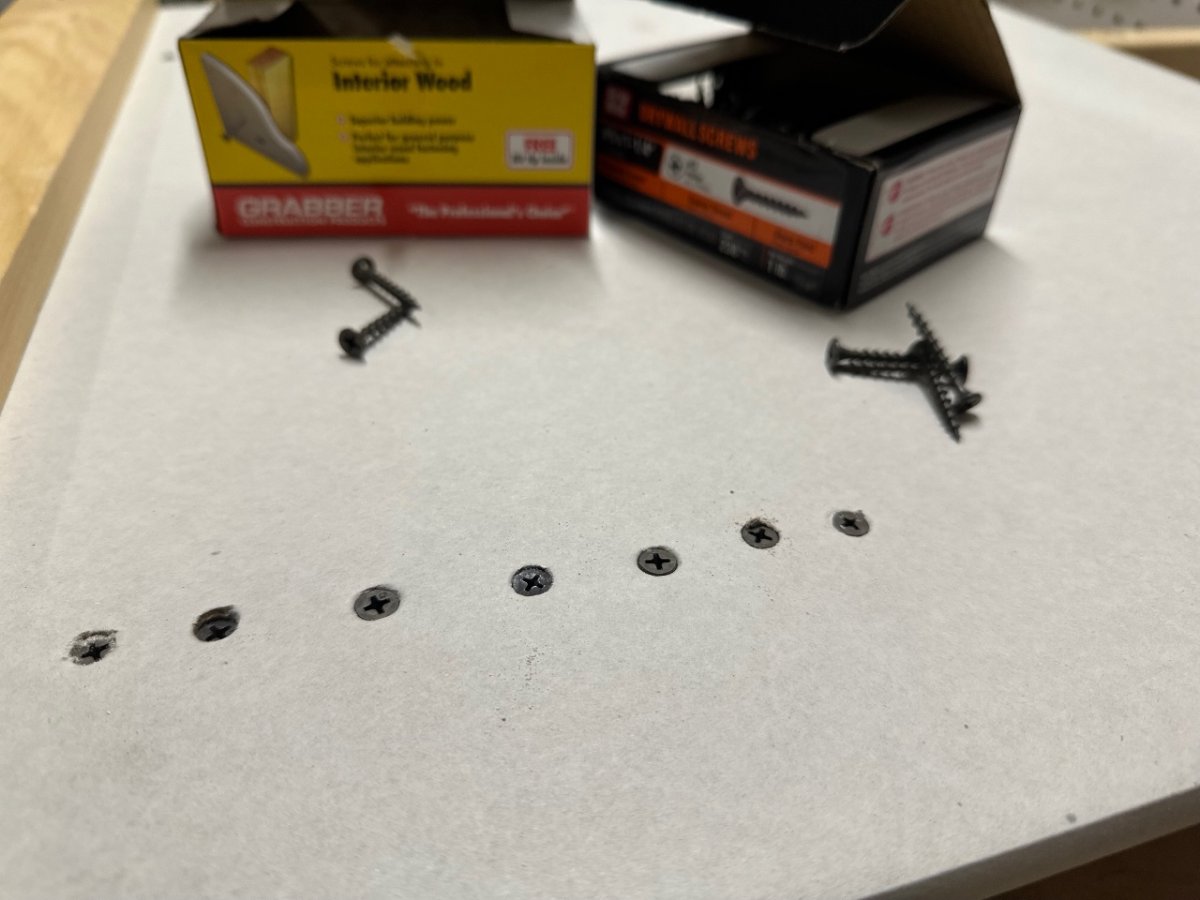
What to Consider When Choosing Drywall Screws
While you can indeed use nails on drywall, screws are often the better way to go in terms of a long-lasting, secure fit. Along with making sure you’re working with one of the best drywall screw guns on the market, the type of thread, length, gauge, and material are all factors to consider when choosing the best drywall screw for the job. Additionally, many projects benefit from the added security offered by one of the many common types of drywall anchors available today. By the way, if you’re not sure how to install a drywall anchor, don’t worry—we have you covered there, too.
Thread
Drywall screws come with either coarse or fine threads. Coarse threaded drywall screws have wider-set grooves. This design is ideal for attaching drywall screws to wood as it allows more material to catch between the threads, preventing the screw from stripping the wood during installation or pulling out later on.
Drywall screws with fine threads are better suited for attaching drywall to metal studs. These screws have a self-drilling tip that allows them to bore into metal surfaces. Their fine threads are better able to bore into metal than coarse threaded screws.
Length
As a rule of thumb, your drywall screw length should be ¾ inch longer than the width of the sheet of drywall in order to sink deeply enough into the stud to hold the Sheetrock to the wall or ceiling. Keeping this in mind, for ½-inch thick drywall, the most common kind, use 1¼-inch screws. For thicker ⅝-inch drywall, go with 1⅜-inch screws. Use 1-inch screws for thinner ¼-inch drywall.
Gauge
Gauge is the thickness or diameter of a screw’s shaft and determines how strong it is. The higher the gauge number, the thicker the screw’s shaft. Nearly all drywall screws come in #6 gauge, which is strong enough to secure a sheet of drywall to studs when using an adequate number of drywall screws (about 32 per sheet), or #8 gauge, a slightly bigger diameter that is better for screwing into materials where grip and control are paramount (think older, softer woods).
Material
Drywall screws come in a variety of materials, including stainless steel, zinc, and phosphate-coated steel, which are the most common type. This phosphated finish resists corrosion while also allowing mudding to better adhere to the screw head. Stainless steel and zinc screws are less common but are sometimes used in areas that are prone to high humidity as they offer the best resistance to rust.
Additional Features
Drywall screws come with other design features to suit different needs. Some screws have self-drilling tips that make it easier to seat the screw in the drywall. Most drywall screws have bugle-shaped heads designed to sink into the drywall surface. Specialty trim-head screws have smaller and flatter heads that are ideal for attaching trim to drywall. Additionally, if you’re using a collated screw gun, many types of collated drywall screws are readily available and can make big jobs a lot less daunting. For most DIYers, though, the screws reviewed above should be more than up to the task.
Meet the Tester
Tony Carrick is a freelance writer specializing in home improvement, landscaping, technology, home security, and design. His articles have been featured on such sites as Angi, Popular Science, Futurism, 360 Reviews by U.S. News & World Report, Domino, and more. Carrick has conducted rigorous product testing on everything from power tools to home security systems to backyard grills. With each review, his goal is to help readers determine whether a product meets their needs and if it is or isn’t worth its price tag.
